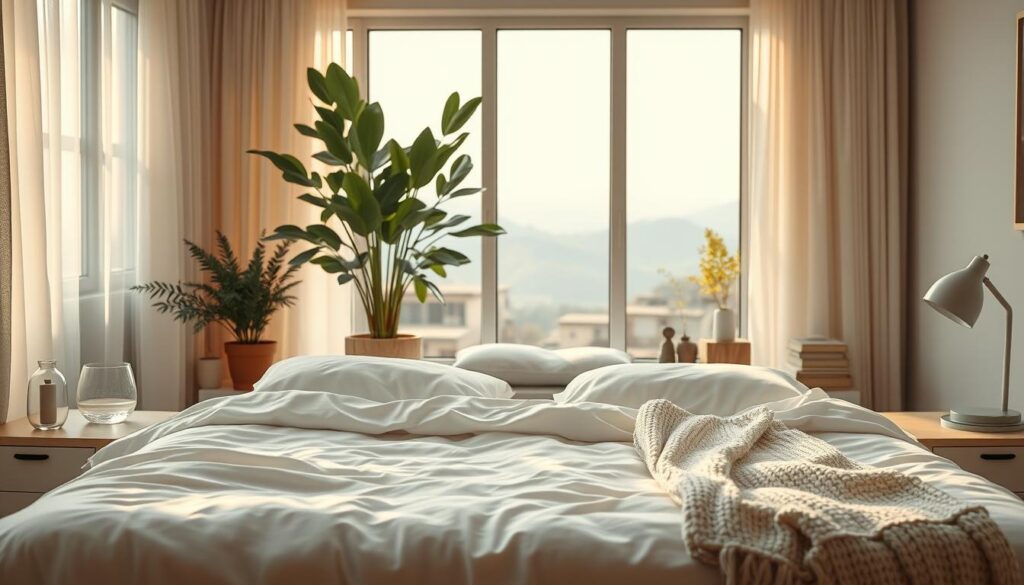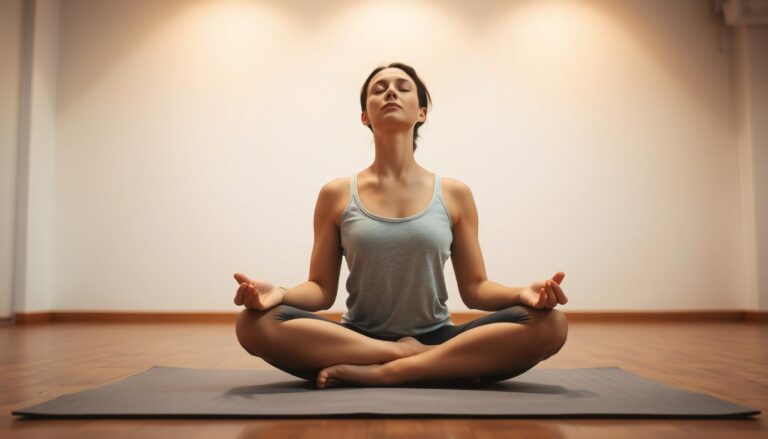Are you tired of tossing and turning all night? Do you dream of waking up feeling refreshed? There are natural ways to sleep like a rock.
Millions of Americans struggle with poor sleep. They face restless nights and groggy mornings. But, natural sleep remedies can help without the need for meds.
Getting better sleep is possible. By learning about sleep science and making lifestyle changes, you can improve your sleep. This way, you’ll wake up feeling energized and ready for the day.
Key Takeaways
- Discover natural strategies for deeper, more restorative sleep
- Learn how lifestyle changes impact sleep quality
- Understand the connection between natural remedies and restful nights
- Explore holistic approaches to improving sleep patterns
- Gain insights into creating the optimal sleep environment
Discover how simple steps can help restore deep, refreshing sleep. Start learning more today.
Understanding the Science of Natural Sleep Cycles
Sleep is more than just resting. Our bodies have an internal clock called the circadian rhythm. It controls when we’re awake and when we sleep.

Our sleep pattern has different stages. Each stage helps our body and mind recover. Knowing these stages can help us sleep better.
Your Body’s Natural Sleep Timing
Melatonin is key in sleep cycles. It’s a hormone that tells our body it’s time to sleep. When it gets dark, melatonin levels go up, making us sleepy.
The Rhythm of Rest
Many things affect our sleep-wake cycle. Maintaining a consistent sleep schedule helps our body’s natural rhythm. This leads to better sleep.
Sleep Like A Rock: Essential Lifestyle Changes for Deep Sleep

Changing your sleep habits is not about big changes. It’s about making small, smart choices. Deep sleep tips begin with knowing how our daily actions affect our sleep. Our bodies love routine, and a steady sleep schedule can greatly improve how well we sleep.
Regular exercise is key for better sleep. Try to do 30 minutes of moderate activity each day. But, don’t work out too hard right before bed. Exercise helps our bodies get into a natural sleep cycle, leading to deeper sleep.
Managing stress is also vital for good sleep. Mindfulness practices like meditation and deep breathing calm our nervous system. These activities tell our body it’s time to relax, helping us shift from being awake to being sleepy.
What we eat also affects our sleep. Cut down on caffeine after 2 PM, drink less alcohol, and don’t eat big meals close to bedtime. Choose foods like cherries, almonds, and herbal teas that help us relax.
Keeping a regular sleep schedule is crucial. Try to go to bed and wake up at the same time every day. This helps our internal clock stay in sync, making it easier to fall asleep and wake up feeling good.
Wake up feeling recharged and ready for the day. See how you can begin your journey now.
Creating the Perfect Sleep Environment
Turning your bedroom into a sleep haven needs careful planning and design. Your bedroom’s setup greatly affects how well you sleep. The right setting can make a big difference in your sleep quality and health.
Keeping your room at the right temperature is key. Experts say to keep it between 60-67 degrees Fahrenheit for the best sleep. A cooler room tells your body it’s time to sleep, helping you fall asleep faster and sleep deeper.
Lighting and Comfort Considerations
Soft, dim lights help your body get ready for sleep. Think about using blackout curtains to block out outside light. Staying away from bright screens before bed also helps your body make sleep hormones.
Bedding and Comfort Selections
Choose breathable, quality bedding that keeps your body cool. Natural materials like cotton and bamboo are good for managing sweat and comfort. Pick mattresses and pillows that fit your body’s shape.
Noise Reduction for Sleep
Reducing noise is important for a quiet sleep space. Use white noise machines, earplugs, or curtains that soak up sound. Soft sounds like rain or ocean waves can also cover up loud noises.
Natural Supplements and Herbs for Better Sleep
Struggling with sleep can be tough. But, natural sleep aids offer a gentle way to improve rest. Herbal sleep remedies have been used for centuries to help people sleep better. Nature gives us many options for better sleep, from calming herbs to sleep-promoting supplements.
Magnesium is a strong natural sleep aid. It relaxes muscles and calms the nervous system. Many find magnesium supplements cut down on nighttime wake-ups and boost sleep quality. Valerian root is also well-known for its sedative effects, helping people fall asleep faster and sleep deeper.
Chamomile tea is a classic natural sleep solution. Its gentle properties can reduce anxiety and prepare the body for relaxation. Lavender essential oils are also popular for sleep. Aromatherapy with lavender can make your sleep environment soothing, leading to faster and more restful sleep.
Always talk to a healthcare professional before starting any new supplement. Natural sleep aids can be effective, but everyone reacts differently. Some supplements might interact with medications or have side effects. A personalized approach helps you find the best natural solution for your sleep issues.
Evening Routines That Promote Restful Sleep
Creating a thoughtful bedtime routine can change your sleep quality and well-being. The hours before sleep are key to getting your body and mind ready for rest.
Digital Detox Before Bedtime
A digital detox is key for better sleep. Blue light from screens messes with melatonin, making it hard to sleep. Try to stop using electronic devices at least an hour before bed.
Instead, do calming activities that tell your brain it’s time to relax.
Relaxation Techniques and Meditation
Evening meditation and relaxation techniques can lower stress and get your body ready for sleep. Simple activities like deep breathing, progressive muscle relaxation, and guided imagery calm your nervous system. Even 10-15 minutes of meditation can greatly improve your sleep.
Timing Your Last Meal
When you eat is as important as what you eat. Eating big meals close to bedtime can mess with your sleep. Try to eat your last meal 2-3 hours before bed.
Light, easy-to-digest snacks are okay if you’re still hungry. But avoid big, hard-to-digest meals.
By using these tips, you’ll make a peaceful bedtime routine. This will help you sleep faster, deeper, and more restfully.
Conclusion
Improving sleep quality is a journey that needs patience and trying different things. The tips we’ve shared offer a clear path to better sleep. They cover everything from knowing your sleep cycles to setting up the perfect sleep space.
Changing your sleep habits takes time. Begin with one or two tips that appeal to you. It could be tweaking your evening routine, trying natural sleep aids, or making your bedroom sleep-friendly. Even small steps can make a big difference in how well you sleep.
Good sleep is key to your health. By focusing on rest and using a holistic approach, you can feel more energetic and mentally sharp. Pay attention to your body, be patient, and see sleep improvement as a journey of self-care.
The goal is to find a sleep plan that fits you perfectly. Embrace the journey, stay committed, and watch your nights get better and your days more lively. Your journey to better sleep starts today.




